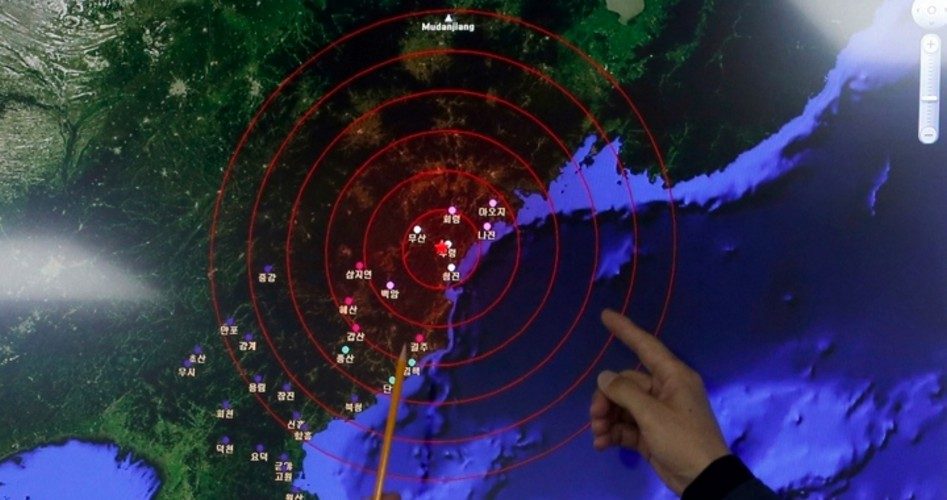
Yesterday, North Korea — known for bluff and bluster — claimed to have successfully detonated a hydrogen bomb. The Hermit Kingdom said the test detonation of a miniaturized hydrogen bomb was conducted “in the most perfect manner” and will serve as a deterrent to the “ever-growing nuclear threat and blackmail by the U.S.-led hostile forces.”
While many doubt that North Korea actually tested a hydrogen bomb, there was a large explosion that caused a fairly significant earthquake near a known nuclear testing site. It is likely that Pyongyang tested a more conventional weapon with the addition of small amounts of hydrogen, according to reports by South Korean news agencies. The Korea Meteorological Administration, located in Seoul, South Korea, was unable to detect any radiation resulting from the test.
KNCA — the North Korean state news agency — reported that “the H-bomb of justice” will help protect North Korea from the “ever-growing nuclear threat and blackmail by the U.S.-led hostile forces,” adding:
The U.S. is a gang of cruel robbers which has worked hard to bring even a nuclear disaster to the DPRK [Democratic People’s Republic of Korea], not content with having imposed the thrice-cursed and unheard-of political isolation, economic blockade and military pressure on it for the mere reason that it has differing ideology and social system.
While nations in the region reacted with both anger and skepticism, White House press secretary Josh Earnest cited data from a variety of nuclear monitoring sources and said that the facts are “not consistent with North Korean claims of a successful hydrogen bomb test.” The U.N. Security Council called an emergency session and called the test — whether real or not — a “clear threat to international peace and security.” North Korea is already under strict UN sanctions and this may make matters worse. Not that the repressive regime much cares.
It is very doubtful that North Korea — technologically backward and struggling to stay ahead of rolling electric blackouts all over the reclusive nation — has actually developed a hydrogen bomb. Pyongyang has been trying to develop a nuclear arsenal since at least 2006, when it claimed to detonate a small plutonium bomb. That test resulted in the UN Security Council voting unanimously to impose military and economic sanctions. The sanctions have not kept North Korea from continuing to conduct tests in an attempt to enter the nuclear bomb club.
This is the first test — or supposed test — since 2013.
The difference this time — besides the fact that there was no advance notice of the test — is that North Korea is making the audacious claim of possessing a hydrogen bomb. Such bombs — known as thermonuclear bombs — are considerably more powerful and destructive than atomic bombs. The hydrogen bomb the United States tested at Bikini Atoll in 1954 produced more than 1,000 times more energy — and destructive power — than the “Little Boy” atomic bomb dropped on Hiroshima in August 1945. That bomb had a blast radius of approximately one mile and caused fires in a radius of about four and a half miles. It killed somewhere between 60,000 and 80,000 people and injured another 70,000.
Besides being more powerful and destructive, hydrogen bombs are considerably more difficult to design and build. North Korea has long had a reputation for making claims that later turned out to be little more than wishful thinking. This appears to be another of those times.
According to South Korea’s National Intelligence Service, the blast and seismic wave produced by North Korea’s alleged “H-bomb of justice” was less than that of the last test conducted by the communist regime in 2013, so it is well below that which would be produced by even a small hydrogen bomb. It was, nonetheless, roughly equivalent to the blast and power of “Little Boy,” so there is some cause for concern.
North Korea’s regional neighbors have reacted to the claim and the test by saying they will act to protect their sovereignty and interests in the region. South Korean President Park Geun-hye said that North Korea must “pay the price” for the test. She said her government will seek additional UN sanctions against its northern neighbor. Japanese Prime Minister Shinzo Abe said that Japan “absolutely cannot tolerate” North Korea’s continued efforts to build and test nuclear weapons and said that Japan will respond. He did not elaborate.
The White House is “monitoring the situation” and will “respond appropriately,” according to a statement. John Kirby, a spokesman for the U.S. State Department, said, “We have consistently made clear that we will not accept [North Korea] as a nuclear state,” adding, “We will continue to protect and defend our allies in the region.”
Photo of South Korean meteorologists examining seismic activity from North Korea’s alleged thermonuclear test: AP Images




